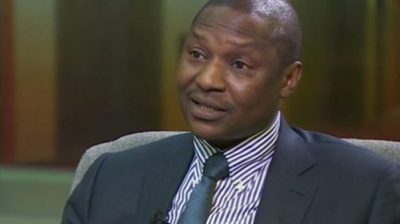
The minister, who made this position known in a phone in programme on Radio Kano, monitored in Abuja, also maintained that the electoral bill had “excessive cost implications, and hence would not be signed by the president”.
The amended bill had many innovations that would improve the electoral fortunes of the country and allow it to be at par with global standards.
But President Buhari, who had vowed to reform the electoral process, after clinching the presidency in his fourth attempt, declined his assent over an aspect of the bill: direct primaries for parties as against indirect primaries which allowed governors more latitude to influence the electoral process.
It is not yet clear if the nation’s lawmakers would veto the president as the constitution allows.
But according to Mr Malami, the new electoral bill “has not captured the interest of all Nigerians”. He said signing it into law by the president will further create more crisis in the political space.
He said: “What you should understand about leadership of the country most especially as it regards President Muhammadu Buhari on any law presented to him for signing, the president is entitled to certain rights.
”When you talk about politics he has rights, if you talk about economy the business community also have rights on him, if you are talking about 60 per cent of Nigerians that are not politicians, if you talk about the economy he also has rights.
”if you are talking about security, there is also what is expected from him. The president has to consider laws that are sustainable.
“The job of the president is that of politics, economy, business, security, legislations, politicians and non-politicians.
”This is because the leadership of the country is not for the politicians alone, it is a leadership that affects social life of the people, their religion, economy, security and others.
”This is contrary to the leadership of the legislators which is solely political.”
According to the minister, “the lawmakers are only concerned about their political inclination while the president is concerned about the entire lives of Nigerians made up of politicians and non-politicians.”
He said any bill signed into law by the president must be in the interest of all Nigerians irrespective of their inclinations.
”He is after satisfying the interest of the over 200 million Nigerians he is serving and not a particular sector,” he added.
On the financial burden in the new electoral bill rejected by the president, Mr Malami said:
”Today INEC requires N305 billion for the 2022 general elections. Now if the general election, which is not the newly proposed electoral system, will cost this much, how much will it cost to do the same election in the APC? It might cost at least N200 billion because it will involve everyone.
”Although the good side of the law is that INEC is required to monitor it.
“Therefore if it is assumed that every political party will spend N200 billion, how much will then be spent in conducting the same primary election in 18 political parties just to produce a qualified candidate?
”Let’s assume there are about 60 million politicians in the country, what about the remaining over 160 million Nigerians who have nothing to do with politics? Are you fair to them?
”All the people want are good projects, good road from Abuja to Kano, potable drinking water, good education, school feeding programme and the rest of them.
“Are you fair to the 160 million Nigerians using their wealth just to conduct primary election to produce a party candidate, despite other demands by the public?
“My answer to this is that, to spend this N305 billion that will be given to the INEC and the about N200 billion to be given to the political parties is not fair to the remaining 160 million Nigerians who have no business about politics and political appointments.

